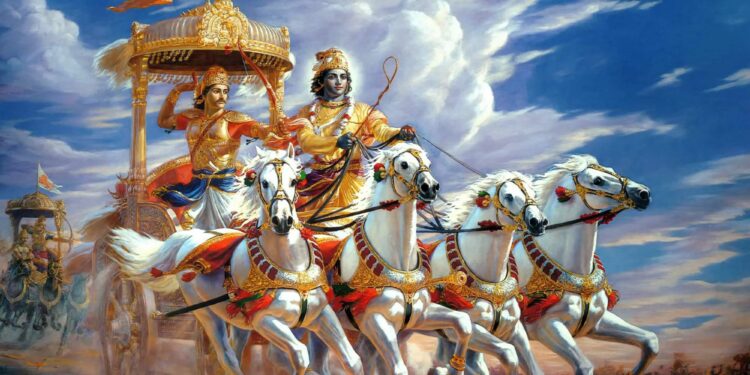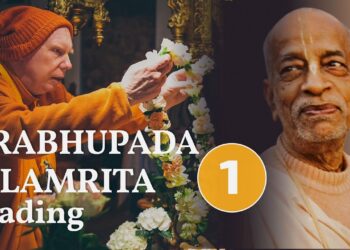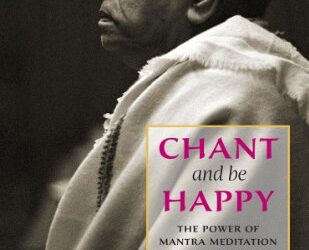TEXT 28
tattva-vit tu mahā-bāho
guṇa-karma-vibhāgayoḥ
guṇā guṇeṣu vartanta
iti matvā na sajjate
SYNONYMS
tattva-vit—the knower of the Absolute Truth; tu—but; mahā-bāho—O mighty-armed one; guṇa-karma—of works under material influence; vibhāgayoḥ—differences; guṇāḥ—senses; guṇeṣu—in sense gratification; vartante—are being engaged; iti—thus; matvā—thinking; na—never; sajjate—becomes attached.
TRANSLATION
One who is in knowledge of the Absolute Truth, O mighty-armed, does not engage himself in the senses and sense gratification, knowing well the differences between work in devotion and work for fruitive results.
PURPORT
The knower of the Absolute Truth is convinced of his awkward position in material association. He knows that he is part and parcel of the Supreme Personality of Godhead, Kṛṣṇa, and that his position should not be in the material creation. He knows his real identity as part and parcel of the Supreme, who is eternal bliss and knowledge, and he realizes that somehow or other he is entrapped in the material conception of life. In his pure state of existence he is meant to dovetail his activities in devotional service to the Supreme Personality of Godhead, Kṛṣṇa. He therefore engages himself in the activities of Kṛṣṇa consciousness and becomes naturally unattached to the activities of the material senses, which are all circumstantial and temporary. He knows that his material condition of life is under the supreme control of the Lord; consequently he is not disturbed by all kinds of material reactions, which he considers to be the mercy of the Lord. According to Śrīmad-Bhāgavatam, one who knows the Absolute Truth in three different features—namely Brahman, Paramātmā, and the Supreme Personality of Godhead—is called tattva-vit, for he knows also his own factual position in relationship with the Supreme.
TEXT 29
prakṛter guṇa-sammūḍhāḥ
sajjante guṇa-karmasu
tān akṛtsna-vido mandān
kṛtsna-vin na vicālayet
SYNONYMS
prakṛteḥ—of material nature; guṇa—by the modes; sammūḍhāḥ—befooled by material identification; sajjante—they become engaged; guṇa-karmasu—in material activities; tān—those; akṛtsna-vidaḥ—persons with a poor fund of knowledge; mandān—lazy to understand self—realization; kṛtsna-vit—one who is in factual knowledge; na—not; vicālayet—should try to agitate.
TRANSLATION
Bewildered by the modes of material nature, the ignorant fully engage themselves in material activities and become attached. But the wise should not unsettle them, although these duties are inferior due to the performers’ lack of knowledge.
PURPORT
Persons who are unknowledgeable falsely identify with gross material consciousness and are full of material designations. This body is a gift of the material nature, and one who is too much attached to the bodily consciousness is called manda, or a lazy person without understanding of spirit soul. Ignorant men think of the body as the self; they accept bodily connections with others as kinsmanship, the land in which the body is obtained is their object of worship, and they consider the formalities of religious rituals to be ends in themselves. Social work, nationalism and altruism are some of the activities for such materially designated persons. Under the spell of such designations, they are always busy in the material field; for them spiritual realization is a myth, and so they are not interested. Those who are enlightened in spiritual life, however, should not try to agitate such materially engrossed persons. Better to prosecute one’s own spiritual activities silently. Such bewildered persons may be engaged in such primary moral principles of life as nonviolence and similar materially benevolent work.
Men who are ignorant cannot appreciate activities in Kṛṣṇa consciousness, and therefore Lord Kṛṣṇa advises us not to disturb them and simply waste valuable time. But the devotees of the Lord are more kind than the Lord because they understand the purpose of the Lord. Consequently they undertake all kinds of risks, even to the point of approaching ignorant men to try to engage them in the acts of Kṛṣṇa consciousness, which are absolutely necessary for the human being.



















